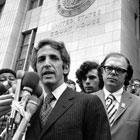
The Most Dangerous Man in America: Daniel Ellsberg and the Pentagon Papers 2009
Distributed by New Day Films, 190 Route 17M, P.O. Box 1084, Harriman, NY 10926; 888-367-9154 or 845-774-7051
Produced by Judith Ehrlich and Rick Goldsmith
Directed by Judith Ehrlich and Rick Goldsmith
DVD, color and b&w, 94 min.
Jr. High - Adult
History, American History, Vietnam War, U.S. Foreign Policy, Peace Activism
Date Entered: 11/18/2010
Reviewed by Christopher Lewis, American University Library, American UniversityDaniel Ellsberg’s odyssey from being a rising star in the Pentagon to becoming an anti-war activist willing to risk everything for his beliefs is the basis of this documentary. John F. Kennedy’s line that “one person can make a difference and everyone should try” embodies the bold stroke Mr. Ellsberg took that not only changed his life irrevocably but unleashed a chain of events that profoundly changed history.
Mr. Ellsberg is singly responsible for leaking to congress and the press a secret report commissioned by the Pentagon that outlined the military involvement of the U.S. in Vietnam, from the Truman administration into the mid-1960s. The report revealed a pattern of lying that had been propagated by each successive administration since Truman, reaching its zenith during the Johnson presidency. The “Pentagon Papers” as they came to be called were published by newspapers nationwide in 1971 during the Nixon Administration.
As evidenced by many Oval Office recordings from the time, the publication of the papers clearly consumed Nixon. His attempts to take revenge on Ellsberg and those who published the report, all of whom he considered treasonous, spectacularly backfired. The Supreme Court sided with the newspapers right to publish the report and in so doing established an important legal protection against censorship prior to publication. Nixon’s paranoid belief that Ellsberg may have secrets about his own war planning led to an ill-advised break-in at Ellsberg’s therapist’s office by the newly-recruited “White House plumbers”. The revelations of the break-in and of Nixon’s intervention in the trial of Ellsberg led to a mistrial and dismissal of charges, and put the White House into a desperate spiral that concluded with Nixon’s resignation. This is less a retelling of the downfall of Richard Nixon, though that’s skillfully framed, than it is about the moral awakening of Daniel Ellsberg. He was a gifted cold war strategist working for Secretary of Defense Robert McNamara. He knew that reports to congress and the press about the war were routinely fabricated but believed the U.S. was on the moral high ground in the fight against communism. Witnessing an escalation in the killing despite high level assessments that the war couldn’t be won changed his view. When a romantic involvement with a peace activist brought him in close proximity to draft resisters he was enlightened. That these men bravely risked long prison sentences to defend what they considered morally right moved Ellsberg to act.
Reviewing the impact and reverberations of Ellsberg’s actions compels one to consider the counterfactual side of this story. What if Ellsberg hadn’t been in the right place at the right time? How much different would things be today? Yet one can’t miss the similarities between the Johnson and GW Bush administrations in terms of coercing public support for a war based on false reports.
This is a compelling and beautifully composed work. It ranks with Fog of War (2003), Hearts and Minds (1974), Vietnam: A Television History (1983), and Berkeley in the Sixties (1990) as essential viewing for those interested in the Vietnam War, modern American politics, and U.S. foreign policy. Highly Recommended for all public and university libraries.